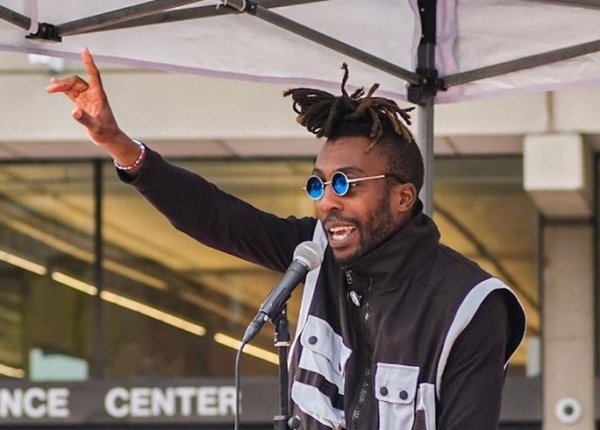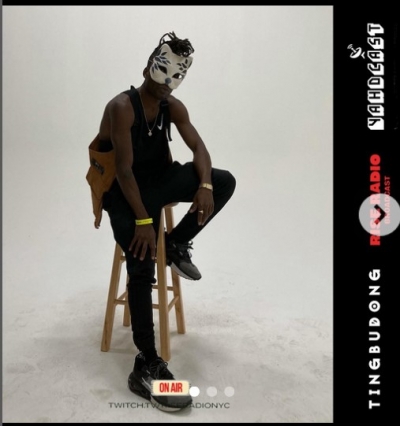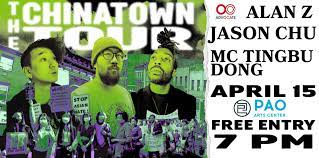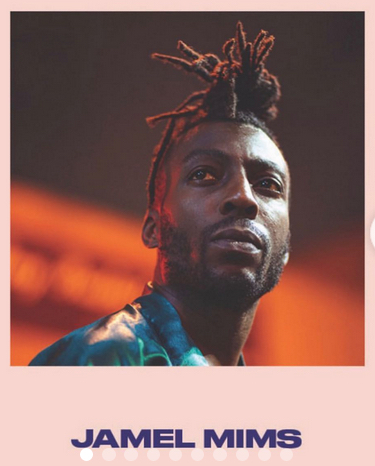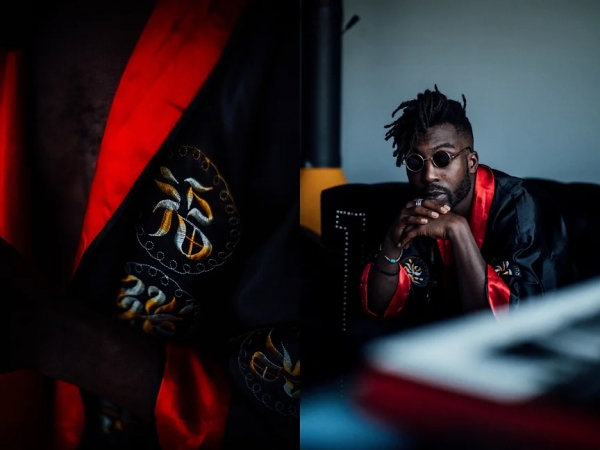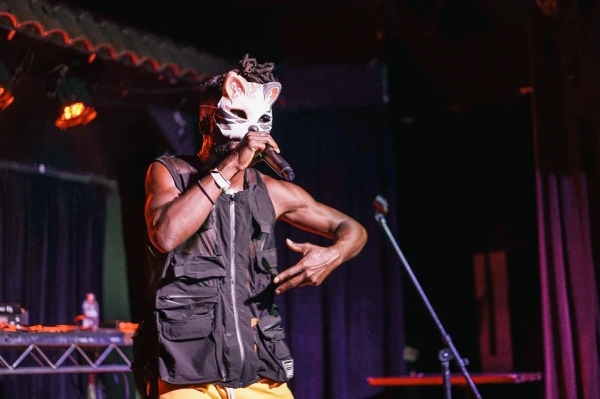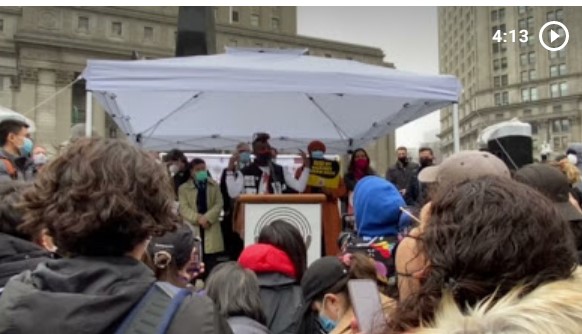The Asian Hip-Hop Scene According to Jamel Mims a.k.a. MC Tingbudong
An Interview by Steve Yip | December 16, 2022
Jamel Mims is a multimedia artist and rapper, who put the message of fundamental social change -- revolution -- into his music and performances. As an artist, he is known as MC Tingbudong who raps in Mandarin Chinese and English. As “Jam No Peanut,” Jamel has also worked as a liaison with the artist community, reaching out to a wide array, and prominently known artists and musicians as well as mobilizing people from various backgrounds against injustice. As “MC Tingbudong,” he has been holding dialogues with various Asian American and Asian hip-hop artists. He most recently joined with other Asian American hip-hop artists in the multicity “The Chinatown Tour” in April 2022. His recent EP
VIRAL was reviewed on MainlyPiano.com.
***
Steve: Hi Jamel, how’s it going? I’ve been trying to pull this brief interview together for some time. Seems like you’re a busy dude.
Jamel: My bad Steve! I guess it's been a busy time for me. I put out my first bilingual music project :
VIRAL, an English/Mandarin rap album and interactive virtual world. I've been performing with Asian American artists as part of The Chinatown Tour, and just finished the Bandung artists residency program with MoCaDa and A4 Arts Alliance. But most of all, I’ve been busiest stepping into parenthood this year: my baby girl Lotus has definitely been keeping me busy!
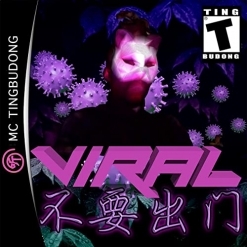
Click on album cover to
go to Steve's review.
Steve: Before we take the next step, give us a background of yourself, where you grew up, and what influenced you to assume the alter ego of MC Tingbudong?
Jamel: My name is Jamel Mims a.k.a. MC Tingbudong; and I’m a bilingual Mandarin and English language rapper and multimedia artist. I’m originally from Southeast Washington DC -- and like many young people coming of age in the dial-up internet days of the early 00’s -- my interests in hip-hop, comics, anime, kung fu movies, video games and the early internet all blended together.
I started taking Mandarin classes in high school, and continued studying the language through college. I would always ask my Chinese teacher, ”Where is the hip-hop music?" I finally got the chance to explore the question while on a yearlong study abroad trip in Beijing in 2007. I was invited to go to an open mic to film a documentary short, “Bling Bling in Beijing,” that actually ended up going viral in the early days of YouTube. When I got to the club it was like my question about Chinese hip-hop was finally being answered in real time: the club was filled with rappers, DJ’s and b-boys -- with the host on stage calling people up to battle or freestyle on stage. I was wearing a T-shirt with the characters 听不懂 (ting bu dong) written on it, which means “I don’t understand,” and jumped up on stage and freestyled in English and Mandarin. The crowd went wild and started chanting “MC Tingbudong”. The next year, I applied for a Fulbright scholarship to study hip-hop in Beijing and return to the same community to produce a multimedia documentary project, which I titled
The Misadventures of MC Tingbudong.
So I got the name back in 2007, but it wasn’t until I returned to China in 2018 (as part of a residency program called Found Sound China) that I really began to create and produce work under the alter ego MC Tingbudong. A lot had changed in the decade or so that had passed. I moved to New York and connected with Cornel West and Carl Dix of the Revolutionary Communist Party, and became an organizer, leading nonviolent civil disobedience actions to protest mass incarceration.
Back in China, my homies in the Beijing hip-hop scene were having a parallel experience confronting state power, as they were being targeted and arrested, and having their music placed on banned lists by the (Chinese) government. I dug more into politics and learned more about the actual history of the Chinese Revolution from the RevComs, studied the long history of Afro-Asian solidarity -- figures such as Paul Robeson and W.E.B. Dubois, and began releasing music inspired by the movement for revolution and my time protesting. In China, there was also now a new generation of hip-hop artists and fans as rap became highly commercialized in China through the popular reality TV show, “Rap of China.”
In 2018, I was selected for the Found Sound residency and returned to China, this time as an artist, working with American and Chinese producers on music to perform a collaborative tour. After this experience, I saw my role as not only connecting Chinese hip-hop to western audiences, but now in bridging two generations of hip-hop -- the golden age and modern era. I think it was this entire process -- from high school to China to New York and back again, that influenced me to assume the alter ego of MC Tingbudong.
Steve: Tell us about “The Chinatown Tour”... Here you have several Asian American artists and yourself, an African American artist, touring and performing in various Asian communities. That's different and what was that all about? In other words, what was its aim?
Jamel: The Chinatown Tour is a series of live performances and workshops aimed at revitalizing Chinatowns as a space for radical art and culture in the wake of the Covid-19 pandemic. Inspired by the international unity of the Black Lives Matter and Stop Asian Hate movements, and the connections between Black, brown, and Asian communities rooted in a shared history of struggle, the project's goal is to to bring diverse communities together in the heart of Chinatowns across the country. To bring this project to life I partnered with Asian-American artists jason chu and Alan Z who have a project called Face Value, a hip-hop album centering 170+ years of Asian American history. I performed my latest project
Viral, a concept album and multimedia conversation between China and Black America.
What began as conversations over dinner with my homie jason chu about two years ago has developed into a project we’ve been able to bring to audiences in Boston, Philadelphia, New York, Pittsburgh and Houston. Our next phase is to bring the tour to the West Coast -- to Chinatowns and Asian communities in Los Angeles, and your hometown of Oakland/San Francisco. In the coming years, we hope this is a tour we can generate funding and community support to bring to every Chinatown across the country, and to Chinese and Asian communities cities in the global diaspora. We envision this project helping to forge a radically-minded diasporic community around the world.
Steve: Tell us more from your perspective of the Asian American hip-hop scene as I am not that familiar with it.
Jamel: I’ve studied hip-hop in China, but I am definitely less familiar with Asian American hip-hop. But I am getting more knowledgeable over the topic via fellow artists on The Chinatown Tour. Asian Americans have long been a part of hip-hop community, particularly in places like New York or LA, growing up alongside other black, brown and immigrant communities. There were many Asian Americans who were part of seminal hip-hop groups such as the 2 Live Crew, Chad Hugo of The Neptunes, DJ Qbert, apl.de.ap of the Black Eyed Peas, Asia Born/Lyrics Born… but I think as far as there being an Asian American hip-hop scene that explicitly identified as such, artists such as the Mountain Brothers, who were the first Chinese American group signed to a major label, and the early 2000’s hip-hop and spoken word poetry scene laid the foundation.
Steve: I knew of the Mountain Brothers back in the 90’s, and heard them performing at a benefit concert in New York Chinatown for the prisoner David Wong, who was the fall guy set up and wrongly accused to take the hit for an upstate New York prison murder.
Jamel: That's dope, man! Wish I had an opportunity to see them live. I think a key moment for the culture was seeing Jin rapping on BET’s 106 and Park - on what was probably the largest platform for emerging rappers at the time, freestyle Friday. It was huge for the culture to see a Asian kid -- not avoiding, but skillfully flipping into the stereotypes which excluded Asian people from mainstream society into punchlines. Today there’s no shortage of Asian American rappers and emcees with bars and style influenced by him.
Hip-hop has also become the global soundtrack of young people around the world - and many Asian countries now have their own homegrown hip-hop scenes which in turn has influenced the sound and popularity of Asian American Hip-Hop. For example, artists such as Rich Brian and Higher Brothers have gained international appeal and crossover into Asian American audiences despite being from Singapore and China respectively. K-Pop artists such as BTS bring together a diasporic community of fans that stretches across the globe. And the popularity of the K-Pop genre overall has impacted the sound of Asian American hip-hop to be more melodic and include more tendencies from R&B music.
I think we are seeing a point where Asian American hip-hop is on stage with some of the largest acts in the world — however in a time of international conflicts and anti-Asian racism, the question still remains what will be the message in the music and culture. For instance, 88rising -- perhaps the largest and most influential Asian American record label, which has thrust many artists into pop culture stardom and hosts a massive series of festivals -- have also been criticized for their relative inaction during the Black Lives Matter uprising of 2020, and a number of other media fumbles.
It's probably best to get familiar through the music itself. Besides the artists mentioned in the article, Here's a short list of some artists to get familiar with the genre:
G Yawazama
jason chu
Alan Z
Bohan Phoenix
Audrey Nuna
Awkwafina
Ted Park
Dumbfounded
Htet
Jay Park
Ruby Ibarra
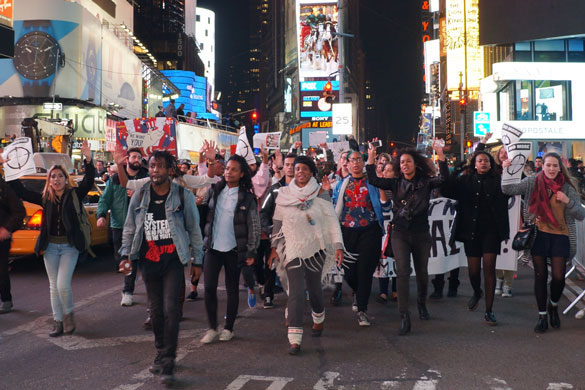
Jamel in Times Square December 2014
Steve: There used to be a brother here in New York named Bert Wang, and I haven’t seen or heard of him since. He had a number called “KFC” -- not the chicken joint, but Kung Fu Cinema! So if Bert sees this interview, give a hollar! And are you familiar with Taiyo Na?
Jamel: Yes! Taiyo Na is dope! I actually got introduced to him through the Bandung Residency, an artist residency I was a part of this year hosted by Asian American Alliance x MoCaDa. Taiyo was in conversation with Nobuko Miyamoto, a Japanese-American artist and performer. Had no idea he was a living legend in the Asian-American hip-hop scene before this performance.
Steve: What’s your vision and roadmap for your music, and what are your plans for the future?
Jamel: Thinking about ‘the future’ in 2022 is wild. We are living through a very turbulent time in the world with threats of escalating nuclear war between the US and Ukraine, and the looming threat of war with China over Taiwan, and a homegrown fascist movement in the states pitting the rulers of this society against one another. In times like these, people urgently need to get out of the mindset of “staying in their lane” and act in the interest of the people of the world. As the revolutionary communist leader Bob Avakian says, “staying in your lane won’t prevent you from being run over by this system!” In the very near future, there needs to be an international community organizing to get rid of the system of capitalism-imperialism, and prepared to carry out the revolution that would require. That means breaking with so many of the ideas and dead ends that go along with this society, including identity politics and these long-held racial divisions between Black Americans, Asian Americans, and the broader immigrant community.
I see my music and art as part of contributing to this process of making revolution - and playing a role in changing the way that people think. I hope my music and art can help people confront the stark reality we find ourselves in and transform how we think about the future. My ultimate vision for my music and art is to one day reach millions of people here and around the world. The roadmap for my work relies on being able to connect to global audiences through a variety of content: music, social media, gaming, organizing in-person and virtual events.
In this regard, I am working on two projects currently: The Chinatown Tour, which I spoke about earlier, and
VIRAL, a bilingual rap album, virtual world and interactive performance experience.
Viral is a concept album created as a conversation between black America and China during the Covid-19 pandemic. The project released last year, and is accompanied by a virtual world, an immersive web-based experience where listeners can explore each song, chat and connect with other listeners in a game-like 3D environment. The album is imagined as a video game from a revolutionary futuristic society, inspired by the Constitution for the New Socialist Republic of North America. Since its release, the platform has hosted panel discussions, parties and virtual concerts featuring artists from across the Black and Asian diaspora.
In the next phase I plan to release the project to Chinese platforms via Modern Sky, a Beijing-based label, and to develop the virtual world into an installation and live performance series in partnership with the Bandung artist residency program. Next year, I plan to continue The Chinatown Tour, release new music and interactive experiences, and hope to return to China to share
VIRAL as soon as that’s possible. Outside of this project, In the near future I also plan to produce a radio show, documentary and book about
The Misadventures of MC Tingbudong. But in the meantime, I’m learning to navigate my creative ambitions with the responsibility of being a new parent.
I have a goal of one day reaching millions with my work, but this is my first EP as MC Tingbudong -- so I still see myself as pretty new in the game!
Steve: Damn! This interview has been monumental! Thanks for this amazing insight about this unexplored music scene you are helping to root with a culture for fundamental social change! Mahalo!

